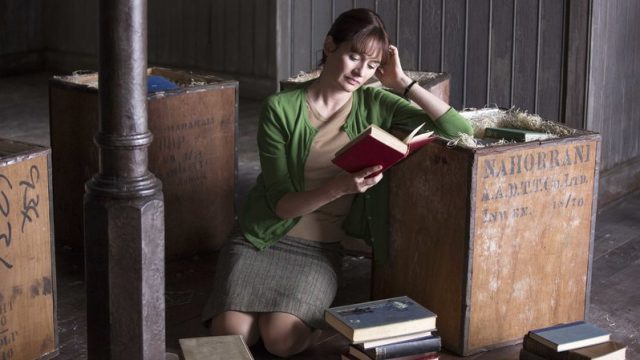Florence Green, played by a gamely innocent Emily Mortimer, is a bit of a naive twit who has a dream of running a bookshop in a building so damp it should be condemned. In the mid-1950s, after the death of her husband, Florence Green moves to a sleepy coastal town with the dream of opening the very first bookshop in the city. In this world, the city is full of anti-intellectual workers who don’t seem to have television yet do not have any time for reading…or something. This is a group so anti-intellectual they don’t even read smut! What kind of fairy tale town is this? I’m calling bullshit right from its initial Footloose-esque presence where reading is practically outlawed.
Lest you be confused, The Bookshop is no Footloose for librarians. Writer-director Isabel Coixet, working from a novel by Penelope Fitzgerald, is not interested in bringing culture to a place absent of culture. Instead, The Bookshop is a story about a woman who is trying to keep her business alive while the town’s ludicrously rich scion, Violet Gamart (an extremely hammy Patricia Clarkson), covets the old, drafty, moldy, waterlogged building that houses the titular bookshop for some sort of arts center passion project of her own. While Violet is intent on destroying Florence for selfish reasons, Florence makes her own baffling decisions like buying 100 copies of Lolita for a town with maybe 50 families. The passive delights of a white lady’s Footloose makes way for a cozy, congenial edition of Dogville, where most of the town turns on the well-meaning newcomer in the face of capitalist suffering.
Even though Coixet strips out any semblance of noose tightening, The Bookshop is close to two hours long, spending long periods of time spinning its wheels on meaningless side characters like the young fire-headed moppet Christine and the adorable curmudgeonly hermit Edmund (Bill Nighy at his crankiest). Coixet pulls them into the web to have their stories go mostly nowhere until a concocted finale that completely changes the intention of the original story.
All of this anti-elitism is delivered in a package designed to appeal to the same people it villainizes, which would be delicious irony if the movie were constructed with any semblance of competence. Instead, Coixet seems like she was battling her own economic forces. Patricia Clarkson is mostly filmed on a set that looks like it has two walls months after the rest of the action happened; she’s supposed to be in a world separated from the rest of the town but it seems more like a movie filmed separately for budgetary reasons. The acting spans the gamut from Merchant-Ivory snoozefest all the way to Joan Crawford. The cinematography is atrocious, where people’s heads are cut off out of frame, and the camera moves either a beat too early or late when just panning down on somebody’s face. The construction of this film would be excusable for a student’s first film, but not for a director two decades into her career.
The Bookshop is a blunt affair though it tries to mask its brusque nature with a boring elitist charm for rich white ladies who want to appear cultured. This is a film where people could manufacture unironic vegan alerts for the people eating meat, and those critics will be taken seriously. If you like sipping tea, tea cozies, lace, books, tweed, sweaters, lux fabrics, and overdone wallpapers, this is a movie for you. But, it’s not very good. The Bookshop is overlong, understuffed, poorly paced, poorly filmed, and completely overwritten. The Bookshop is a travesty that only becomes enjoyable in the final 3 minutes because nothing of note has happened in the preceding 110 minutes.


